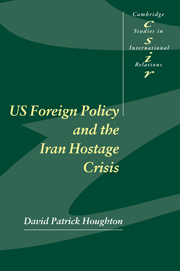Book contents
- Frontmatter
- Contents
- Preface
- 1 Jimmy Carter and the tragedy of foreign policy
- 2 Locating the argument: a review of the existing literature
- 3 The origins of the crisis
- 4 The waiting game
- 5 Days of decision: the hostage rescue mission
- 6 Hostages to history
- 7 Some alternative explanations: non-analogical accounts of the Iran decision-making
- 8 Conclusion
- Appendix 1 Dramatis personae
- Appendix 2 The major historical analogies used
- Bibliography
- Index
- CAMBRIDGE STUDIES IN INTERNATIONAL RELATIONS
3 - The origins of the crisis
Published online by Cambridge University Press: 22 September 2009
- Frontmatter
- Contents
- Preface
- 1 Jimmy Carter and the tragedy of foreign policy
- 2 Locating the argument: a review of the existing literature
- 3 The origins of the crisis
- 4 The waiting game
- 5 Days of decision: the hostage rescue mission
- 6 Hostages to history
- 7 Some alternative explanations: non-analogical accounts of the Iran decision-making
- 8 Conclusion
- Appendix 1 Dramatis personae
- Appendix 2 The major historical analogies used
- Bibliography
- Index
- CAMBRIDGE STUDIES IN INTERNATIONAL RELATIONS
Summary
We had no feeling for the view of the vast majority of the Iranian people at the time. Because they believed as an article of faith that if the Shah came to the United States, it would usher in a series of events similar to those that had happened in 1953, when the CIA ... assisted the pro-Shah demonstrators in overthrowing Mohammed Mossadegh and putting the Shah back on the Peacock throne. They believed that as an article of faith. Whether it was true or not is irrelevant.
Former American hostage Charles ScottIran is an island of stability in one of the more troubled areas of the world
President Jimmy Carter, speaking on 31 December 1977Implicit in chapter 2 is the assumption that the psychological approach to foreign policy analysis popularized by scholars like Robert Jervis, Ole Holsti and Alexander George explains the behaviour of human beings in a decision-making context, not merely that of decision-makers in the United States. Yet most case study analyses which employ a foreign policy decision-making approach have examined their case materials as they were viewed from the American perspective and as the issues were confronted by American decision-makers. The Cuban missile crisis has been exhaustively analysed from the perspective of John Kennedy and the ExComm, for example. The decisions of Third World states, on the other hand, are rarely viewed through cognitive psychological lenses, and there is even a paucity of theoretically driven studies of British foreign policy.
- Type
- Chapter
- Information
- US Foreign Policy and the Iran Hostage Crisis , pp. 46 - 74Publisher: Cambridge University PressPrint publication year: 2001



